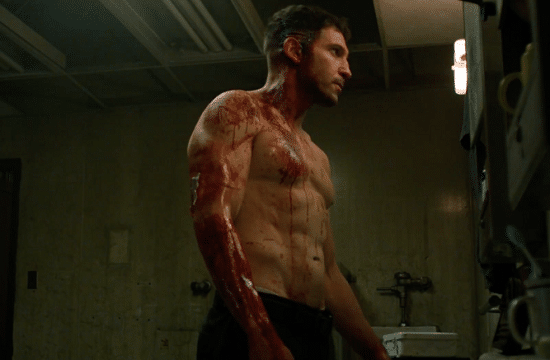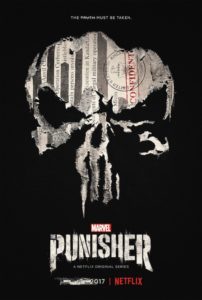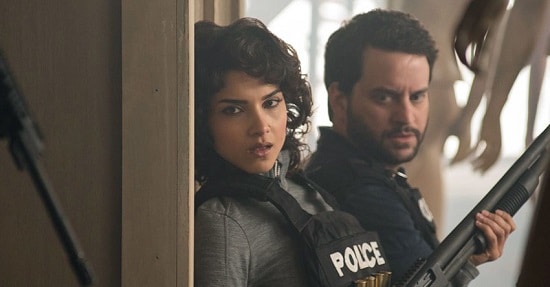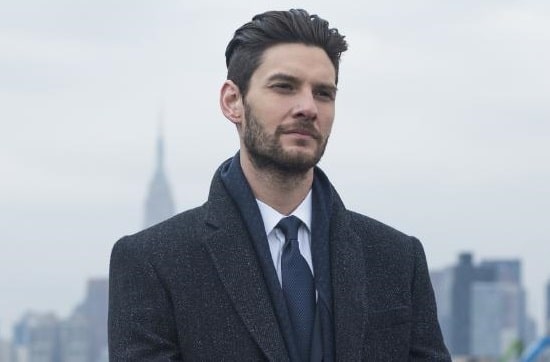 Much as they have at the multiplexes, Marvel have carved out a real niche for themselves with their Netflix shows. Whilst their big screen ventures remain resolutely big budget, globe/universe-hopping fantastical adventures bringing the comic label’s most grandiose superheroes to life, these small screen offshoots, while ostensibly still set in that same (buzzword alert) cinematic universe, centre on smaller, street-level characters fighting rather more grounded battles. 2015’s first season of Daredevil established right away that these New York City streets (on which all the Marvel Netflix shows have been primarily set) are a considerably rougher place where superpowers are far less prominent, and brutal, bone-crunching, blood-spattering violence is the rule of law.
Much as they have at the multiplexes, Marvel have carved out a real niche for themselves with their Netflix shows. Whilst their big screen ventures remain resolutely big budget, globe/universe-hopping fantastical adventures bringing the comic label’s most grandiose superheroes to life, these small screen offshoots, while ostensibly still set in that same (buzzword alert) cinematic universe, centre on smaller, street-level characters fighting rather more grounded battles. 2015’s first season of Daredevil established right away that these New York City streets (on which all the Marvel Netflix shows have been primarily set) are a considerably rougher place where superpowers are far less prominent, and brutal, bone-crunching, blood-spattering violence is the rule of law.
All this being the case, The Punisher was a natural addition to this particular corner of the MCU. The character, created in the mid-70s by writer Gerry Conway and artists John Romita Sr. and Ross Andru, has long been something of an oddity in Marvel Comics. Completely free of superpowers, he’s a skilled but deeply troubled war veteran who, following the murder of his family, turns vigilante; but unlike just about every other Marvel hero you could name, he deals out his brand of justice with guns and ammo, and has no qualms whatsoever about leaving anyone that crosses him dead. As such, The Punisher hasn’t always been cast as the good guy, so it made sense that the Marvel Netflix shows introduced him as an antagonist in Daredevil season two; and now, with the character established, they saw fit to give him a show of his own.
 Not that you necessarily need to have watched Daredevil season two, or indeed any of the other Marvel Netflix shows (i.e. Jessica Jones, Luke Cage, Iron Fist and The Defenders), in order to watch The Punisher. All the shows have stood apart to a certain extent, but none more so than this one; beyond the presence of Deborah Ann Woll as Karen Page (who first met The Punisher in Daredevil), and some very brief references to events of the earlier shows, you’d be forgiven for not having the first clue that these characters are meant to exist in the same world as The Avengers. Indeed, perhaps it’s better to put all thoughts of those characters to one side – much as it’s better to put aside whatever recollections you have of the existing screen iterations of The Punisher, as portrayed by Dolph Lundgren, Thomas Jane and Ray Stevenson in the earlier films. Jon Bernthal’s take on the character is something altogether different. Where his predecessors tended to play him as a steely, methodical, near-emotionless killing machine, Bernthal plays him as a roaring, rampaging animal, leaving us under no illusions that this is an utterly unhinged human being whose experiences have left him shattered, robbing him of almost all his humanity. The question of just how much, or how little, of the man that was remains is at the heart of this 13 part series.
Not that you necessarily need to have watched Daredevil season two, or indeed any of the other Marvel Netflix shows (i.e. Jessica Jones, Luke Cage, Iron Fist and The Defenders), in order to watch The Punisher. All the shows have stood apart to a certain extent, but none more so than this one; beyond the presence of Deborah Ann Woll as Karen Page (who first met The Punisher in Daredevil), and some very brief references to events of the earlier shows, you’d be forgiven for not having the first clue that these characters are meant to exist in the same world as The Avengers. Indeed, perhaps it’s better to put all thoughts of those characters to one side – much as it’s better to put aside whatever recollections you have of the existing screen iterations of The Punisher, as portrayed by Dolph Lundgren, Thomas Jane and Ray Stevenson in the earlier films. Jon Bernthal’s take on the character is something altogether different. Where his predecessors tended to play him as a steely, methodical, near-emotionless killing machine, Bernthal plays him as a roaring, rampaging animal, leaving us under no illusions that this is an utterly unhinged human being whose experiences have left him shattered, robbing him of almost all his humanity. The question of just how much, or how little, of the man that was remains is at the heart of this 13 part series.
We join Bernthal’s Frank Castle some untold length of time after he disappeared, and was officially declared dead, at the end of Daredevil s2. Now living under an assumed name with several months’ worth of hair growth on his head and face, he’s making ends meet in a low-level construction job, venting his bottled-up rage with a sledgehammer and doing his utmost to avoid interaction with others. However, neither Frank’s past nor his inner nature has much chance of staying buried for long, and after a criminal element of his co-workers pushes him too far, he’s back in full-on punishing mode. However, his activities do not go unnoticed, and soon Frank finds himself contacted by a mysterious stranger (Ebon Moss-Bachrach) who knows who he is, and demands his assistance. A begrudging partnership ensues, all tied up in an unresolved war crime from some years beforehand, in which Frank and his unit had a key role to play; and which, you guessed it, turns out to be the key reason Frank’s family was assassinated.
As might be apparent from this synopsis, the series takes The Punisher in a political thriller direction, centred on a government/military conspiracy; a welcome change, as the character’s previous screen outings (not to mention the existing Marvel Netflix shows) have tended to centre more on gang wars. That having been said, if you have been keeping up with the Marvel Netflix shows, you’ll be forgiven for noting a clear pattern. The Manhattan skyline is constantly in the distance, the action instead taking place largely in the less touristy areas of NYC. Lengthy, expository duologues, of which there are many, routinely take place by the side of the Hudson in what look to be sub-zero temperatures (come on guys, Game of Thrones always does these bits naked in bed, it’s way more fun). Then we cut away to the supporting characters in plush-looking offices, in this case Homeland Security agent Dinah Medani (Amber Rose-Revah), a hard-nosed careerist obsessed with a long-cold case which suddenly heats up again when she is contacted by the same mystery man on Frank’s tail. While we may not be able to work out all the ifs and buts along the way, it’s readily apparent that, however things get resolved, it’s going involve Frank killing a whole lot of people.
 A lot can be said about the contemporary resonance of The Punisher. Its release had at one point been brought into question in the wake of the recent Las Vegas mass shooting; but let’s face it, if real-life acts of terror dictated whether or not violence could be shown on screen, we’d never see anything but rom-coms. I’m not about to get into the gun control debate (for one, I live in England, so it really isn’t my place to do so), but The Punisher naturally touches on the subject, and while it doesn’t come to any easy conclusions it does ask some interesting questions. Also, in perhaps the most compelling subplot of the series, it tackles the problem of PTSD in war veterans, actor Daniel Webber giving a brilliant, sympathetic performance as a traumatised young ex-soldier who, in his own mind, sets out to follow in Frank Castle’s footsteps in the name of the Second Amendment. In addition, it’s hardly accidental that, in Rose-Revah’s Medani, we have an Arab-American protagonist, whose prime motivation is to solve the murder of an innocent Muslim framed for terrorism (although, if I recall correctly, the words ‘Muslim’ and ‘Islam’ are never uttered).
A lot can be said about the contemporary resonance of The Punisher. Its release had at one point been brought into question in the wake of the recent Las Vegas mass shooting; but let’s face it, if real-life acts of terror dictated whether or not violence could be shown on screen, we’d never see anything but rom-coms. I’m not about to get into the gun control debate (for one, I live in England, so it really isn’t my place to do so), but The Punisher naturally touches on the subject, and while it doesn’t come to any easy conclusions it does ask some interesting questions. Also, in perhaps the most compelling subplot of the series, it tackles the problem of PTSD in war veterans, actor Daniel Webber giving a brilliant, sympathetic performance as a traumatised young ex-soldier who, in his own mind, sets out to follow in Frank Castle’s footsteps in the name of the Second Amendment. In addition, it’s hardly accidental that, in Rose-Revah’s Medani, we have an Arab-American protagonist, whose prime motivation is to solve the murder of an innocent Muslim framed for terrorism (although, if I recall correctly, the words ‘Muslim’ and ‘Islam’ are never uttered).
Then, of course, there’s the question of the violence. As noted earlier, Marvel’s Netflix shows significantly upped the ante on bloodshed – and, for that matter, sexual content – by comparison with the movies, and The Punisher is no exception: indeed, it’s quite possibly the most brutal Marvel show yet, and certainly the most grounded given the complete absence of any superpowered characters. In particular contrast to Daredevil and Iron Fist, extravagant martial arts battles are thin on the ground; the fights here are much more down and dirty, and as likely to be resolved with a bullet as a fist. Still, while such sequences are definitely among the grisliest Marvel have produced (the use of a 28 Days Later-esque music cue in the penultimate episode is clearly no accident, given the finishing move utilised), in the contemporary TV climate they’re not necessarily the harshest things you’ll ever see. Indeed, given how full on The Punisher gets with violence, it feels a little odd that Marvel still play a bit coy when it comes to nudity and swearing; as with the other Netflix shows, they shy away from dropping the F-bomb, and while sex does come into the mix, they still make a point of preserving the modesty of the actors. Feels strangely imbalanced, given how unrelentingly graphic the violence is. (I could make some snide remark about misplaced American values, but I already said I wouldn’t do that…)
 At 13 episodes, The Punisher is perhaps a little more drawn-out than it really needs to be. The conspiracy plot may twist and turn in the usual twisty-turny way, but ultimately the real villains are never that hard to spot: I don’t consider it a spoiler to say that the presence of Ben Barnes as Frank’s one-time best buddy, now a suit-clad charmer running a private military company, should set alarm bells ringing immediately. (For one thing he’s called Billy Russo, the character who becomes the villain Jigsaw, previously portrayed by Dominic West in Punisher: War Zone.) Then there’s Paul Schulze as Rawlins, a high-ranking CIA official with a bald head and ocular scar; yes, all he’s missing is the white cat. Still, as grounded and layered as The Punisher may be, it’s still ultimately a comic book superhero tale, and that demands clear-cut bad guys who will ultimately meet their just desserts in a very direct fashion. This is part of what draws us to these stories, and we shouldn’t belittle The Punisher for delivering this.
At 13 episodes, The Punisher is perhaps a little more drawn-out than it really needs to be. The conspiracy plot may twist and turn in the usual twisty-turny way, but ultimately the real villains are never that hard to spot: I don’t consider it a spoiler to say that the presence of Ben Barnes as Frank’s one-time best buddy, now a suit-clad charmer running a private military company, should set alarm bells ringing immediately. (For one thing he’s called Billy Russo, the character who becomes the villain Jigsaw, previously portrayed by Dominic West in Punisher: War Zone.) Then there’s Paul Schulze as Rawlins, a high-ranking CIA official with a bald head and ocular scar; yes, all he’s missing is the white cat. Still, as grounded and layered as The Punisher may be, it’s still ultimately a comic book superhero tale, and that demands clear-cut bad guys who will ultimately meet their just desserts in a very direct fashion. This is part of what draws us to these stories, and we shouldn’t belittle The Punisher for delivering this.
Yes, Frank Castle remains (another buzzworld alert) problematic as a protagonist, and without doubt elements of the series may upset viewers on all sides of the political spectrum, but I think showrunner Steve Lightfoot and company have done a good job crafting a balanced, relatively neutral show that can be enjoyed by right and left-leaning audiences alike. Above all else, the series certainly confirms Jon Bernthal’s take on the character to be the best we’ve had to date: human, sympathetic, relatable, yet absolutely terrifying, leaving you in no doubt that he could, and probably would, blow your head off as soon as look at you. That’s The Punisher through and through, and it will be interesting to see where they take the character from here, working on the entirely reasonable assumption that further seasons are in the offing.
All 13 episodes of The Punisher are available to watch on Netflix now.
